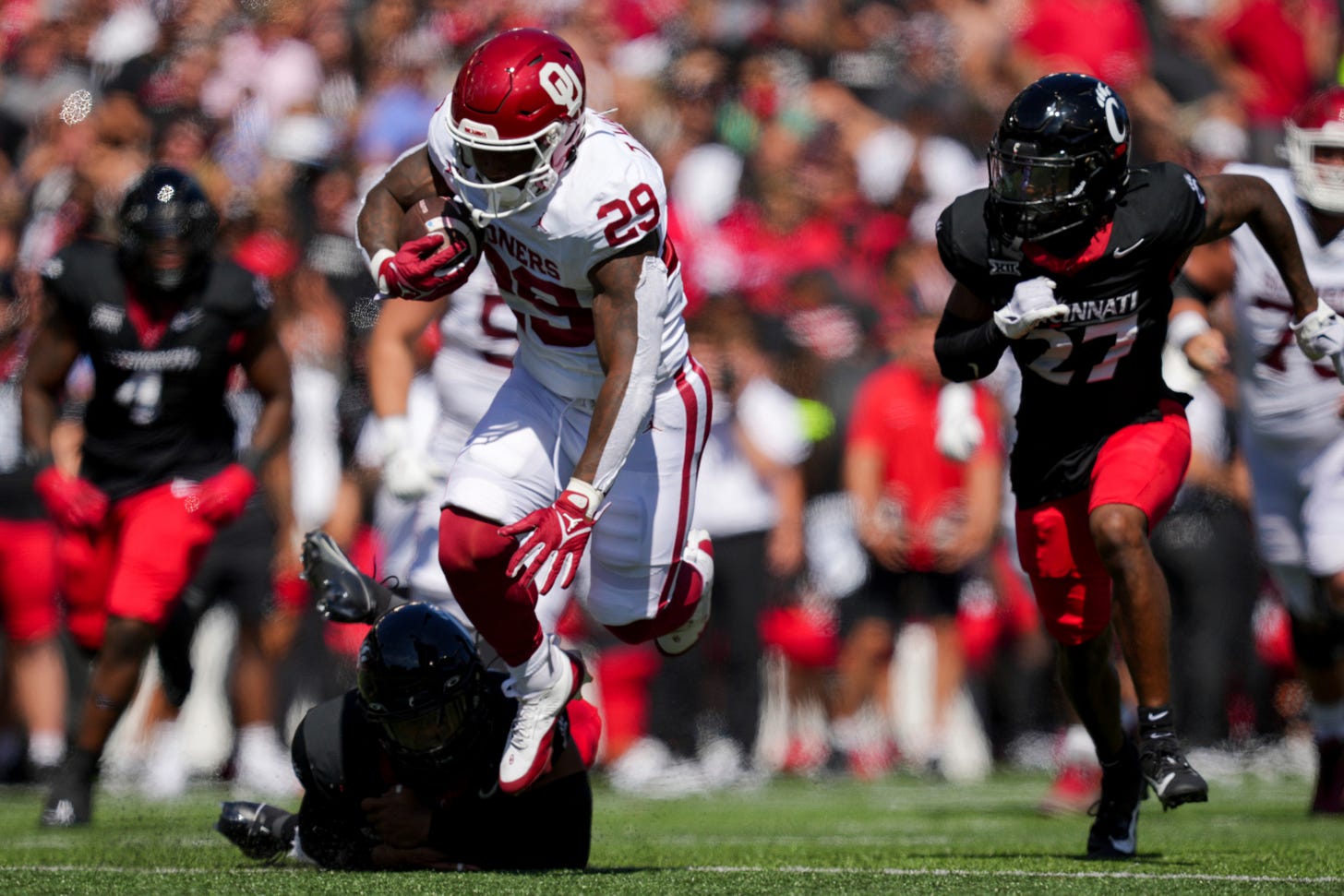Sooners ground game struggles not all they're cracked up to be

It’s a strange thing.
Because your humble columnist, if you haven’t noticed, can be a bit of a perpetual critic.
Like, if the house is on fire, don’t go around telling people it’s not on fire; don’t say you want to play with more pace when you’ve never played with pace going back to Loyola-Chicago; don’t call Jason White's torn ACL a sprained knee; don’t tell us you need one or two more stops when 60 points would have won you the game and Hollis Price is standing right there.
You know what I mean?
So this is a little strange because, according to many, coming out of a 20-6 victory at Cincinnati, the two big issues facing Brent Venables’ second Sooner football team are the quarterback and the running game. Yet, far as I can tell, one’s no issue at all and the other needn’t be.
Let’s quickly address the former so we can spend more time on the latter.
The only narrative that ought be in play concerning Dillon Gabriel is that he’s returned a much better quarterback, able to work the whole field, with far greater accuracy both short and long and until he starts making losing plays that shouldn’t change.
Maybe he could have been better against the Bearcats, and his fumble was unfortunate, but still he completed 26 of 38 passes for 322 yards, led scoring drives when Oklahoma had to have them and was far more integral a part of why the Sooners won, period, than why they only won by 14.
That negative narrative, by the way, is not coming from inside the program. It’s more of a fan and media thing. The head coach was again complimentary of his quarterback on Tuesday.
“He played well, he managed things well, he made good decisions,” Venables said. “He led with toughness.”
All right?
Dude’s still playing terrific football.
Believe it.
As for the running game, the calls are coming from within the program and the guy copping to the issue is Venables himself.
Tuesday, he mentioned much of the Sooner offense is based on RPOs — run-pass options — and it’s possible OU was in position for bigger ground gains than it got, only for Gabriel to decide throwing to be the better option. He also explained, like so many things, one small mistake from any one player can change the whole complexion of any play, so maybe the Sooner ground game is actually quite close to breaking through.
Still, his money quote was this:
“We’d love for somebody to establish themselves,” Venables said. “That hasn’t happened yet.”
Really?
What if I told you there’s a running back on the squad who’s averaging more than 5 yards per carry, who carried the ball 21 times for 117 yards against SMU, who’s also caught five passes for 52 yards, which happens to be five catches and 52 yards more than every other running back on the roster?
What if I told you that, yet for no good reason, one week after enjoying that huge game against the Mustangs, that same player hardly played and received no carries against Tulsa. And last time out at Cincinnati, received only five carries because, as offensive coordinator Jeff Lebby said afterward, the whole idea was to showcase Marcus Major instead.
What if I told you all that?
Indeed, that player exists, his name is Tawee Walker and he’s been terrific this season, only perhaps not good enough for his coaches, who appear to be falling all over themselves trying to make somebody else the primary guy.
“I think it’s hard playing four running backs in the course of a game,” Venables said, an apparent explanation for giving Walker and Major no carries at Tulsa and Gavin Sawchuk none at Cincinnati.
Perhaps he’s right, but that doesn’t mean he can’t do what Bob Stoops and several offensive coordinators before him did: showcase his best back as part of a two- or three-man rotation and let the rest of the work fall where it falls.
Had that been the case the last two weeks, Walker might have claimed two more 100-yard outings and OU’s ground production would look much better than a collective 4 yards per carry: 5.2 for Walker, 4.4 for Jovantae Barnes, 4.2 for Major and 2.6 for Sawchuk.
Perhaps they'll figure it out.
Two years ago, four games into the season, Eric Gray had six more carries than Kennedy Brooks. Yet, by season’s end, Brooks had 119 more carries than Gray and 841 more yards.
A year ago, Gray was force-fed the ball and Gabriel wasn’t given the chance to move the team in the same way he’s been moving it this one, and while Gray had a great season, the conservative Sooners did not.
Somewhere in there a happy medium exists between OU giving its best back the most chances and its quarterback continuing to take flight.
It can be done.
Just as soon, perhaps, as Jeff Lebby and Brent Venables, and maybe running backs coach DeMarco Murray, too, come to understand their best back is their best back, not the back they may wish to be their best.

